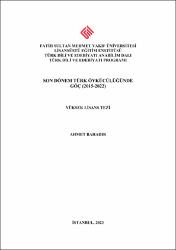| dc.contributor.advisor | Koçak, Mesut | |
| dc.contributor.author | Bahadır, Ahmet | |
| dc.date.accessioned | 2024-03-11T13:21:13Z | |
| dc.date.available | 2024-03-11T13:21:13Z | |
| dc.date.issued | 2023 | en_US |
| dc.identifier.citation | BAHADIR, Ahmet, Son Dönem Türk Öykücülüğünde Göç (2015-2022), Fatih Sultan Mehmet Vakıf Üniversitesi Lisansüstü Eğitim Enstitüsü Türk Dili ve Edebiyatı Anabilim Dalı Türk Dili ve Edebiyatı Programı, Yayımlanmamış Yüksek Lisans Tezi, İstanbul 2023. | en_US |
| dc.identifier.uri | https://hdl.handle.net/11352/4775 | |
| dc.description.abstract | Bu çalışmada Türk öykücülüğü merkeze alınarak insanlık tarihi kadar eski
olan göç olgusunun edebiyattaki aksi incelenmiş; dünyada büyük bir etki uyandıran
son dönem göçlerinin edebiyata ne şekilde yansıdığı tartışılmıştır.
2000’li yıllarda Amerika-Irak savaşı ile başlayan süreç Arap baharı ile devam
etmiş, Suriye iç savaşı ile Türkiye yoğun göç hareketliliğinin merkezi haline
gelmiştir. İlk başlarda kamplara yerleştirilen sığınmacılar sayılarının fazlalaşmasıyla
birlikte şehirlere dağılmaya başlamıştır. Özellikle 2015 yılı sonrasında ülkenin birçok
şehrine yerleşen bu sığınmacılar, toplumla iç içe yaşamaya başlamışlar ve onun bir
parçası olmuşlardır. Son dönem Türk öykücülüğünde bu göçlerin ele alındığı, izlek
olarak seçildiği ve tartışıldığı görülmüştür.
Bu amaçla belirlenen edebiyat dergilerinde 2015-2022 yılları arasında
yayınlanan öyküler bu bağlamda taranmış ve 80 adet öykünün göç olgusu ile
bağlantılı olduğu görülmüş, belirlenen öyküler konularına göre tasnif edilmiştir.
Edebiyat ve göç üzerine kavramsal bir inceleme yapılmış, Türk anlatı geleneğinde
göç olgusunun tezahürü izlenmiş ve tespit edilen öyküler üzerinden göç olgusunun
öyküde ele alınış biçimi incelenmiştir. Çalışmada, disiplinler arası bir yöntemle
sosyoloji biliminin açılımlarından yararlanılmış; insan, kimlik ve aidiyet
kavramlarının göç olgusu ile olan ilişkileri öncelenerek, öykünün bireysel ve
toplumsal anlamda göçü yansıtma şekli incelenmiştir. | en_US |
| dc.description.abstract | In this study, the reflection of the migration phenomenon, which is as old as
the history of humanity, in literature has been examined by taking Turkish
storytelling as the center; it has been discussed how the recent migrations, which
have a great impact on the world, have been reflected in literature.
In terms of the way literature deals with social problems, modern Turkish
storytelling in the recent period has also turned to issues related to people, emotions
and identity. The story, which has a human being at its center, has also examined
how an individual copes with social problems. Fictional reality, which is woven
around the city, urban life, feelings of loneliness, also has a social-oriented side. The
deep connections of man with his roots and the society he lives in through migration,
identity and conflict are featured in the stories.
The process that started with the USA-Iraq war in the 2000’s continued with
the Arab spring, and with the Syrian civil war Turkey has become the center of
intense migration mobility. At first, the refugees who were placed in the camps
began to disperse to the cities with increasing numbers. Especially after 2015, these
ones, who settled in many cities of the country, began to live intertwined with society
and became a part of it. It has been seen that these migrations have been discussed,
selected as a topic and related in Turkish storytelling of the recent period.
The stories published between the years 2015-2022 in the literary journals,
determined for this purpose were read in this context and 80 stories were found to be
related to the phenomenon of migration. The selected stories were classified
according to their themes. A conceptual review on literature and migration has been
made, the manifestation of the phenomenon of migration has been observed in the Turkish narrative tradition and the way in which the phenomenon of migration was
handled in the story has been examined through the identified stories. In the study,
the expansions of sociology science were used with an interdisciplinary method. By
prioritizing the relations of the concepts of human, identity and relation with the
phenomenon of migration, the way of the story reflects individual and social
migration has been examined. | en_US |
| dc.language.iso | tur | en_US |
| dc.publisher | Fatih Sultan Mehmet Vakıf Üniversitesi | en_US |
| dc.rights | info:eu-repo/semantics/openAccess | en_US |
| dc.subject | Göç | en_US |
| dc.subject | Mültecilik | en_US |
| dc.subject | Eleştiri | en_US |
| dc.subject | Kimlik | en_US |
| dc.subject | Öykü | en_US |
| dc.title | Son Dönem Türk Öykücülüğünde Göç (2015-2022) | en_US |
| dc.title.alternative | Migration In Recent Turkish Storytelling (2015-2022) | en_US |
| dc.type | masterThesis | en_US |
| dc.contributor.department | FSM Vakıf Üniversitesi, Lisansüstü Eğitim Enstitüsü, Türk Dili Ve Edebiyatı Ana Bilim Dalı | en_US |
| dc.relation.publicationcategory | Tez | en_US |
| dc.contributor.institutionauthor | Bahadır, Ahmet | |



















